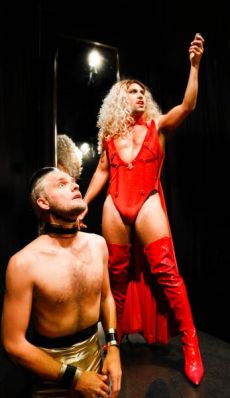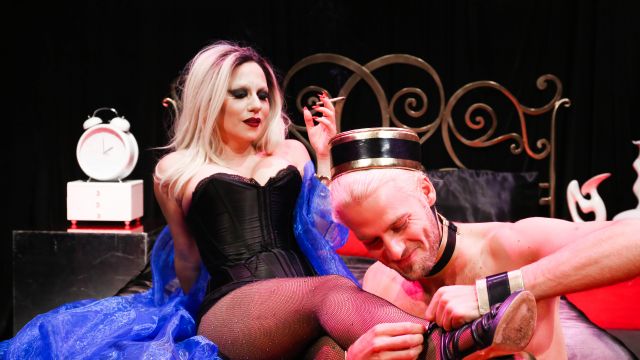The Maids
Jean Genet’s 1947 play is about oppression and the sado-masochistic fantasies it gives rise to. Here it gets another layer in casting the eponymous maids themselves as male. It’s not the first time the play has been performed like this, but one suspects Genet would approve.
It’s not a mere gender switch (leaving us wondering, ‘And the point is…?’). And since the text is poetic - scarcely naturalistic - it works. After all, it’s a play all about role playing – with the roles defined by the maids’ powerless positions. The two men – and they play it more bitchy queen than butch, so that gender too is performance – enhance the very idea of oppression, of difference and of sealed-off, vicious, internecine conflict. Is that dated? Outmoded? Perhaps, but it works.
The maids, Claire (Adam Ibrahim) and Solonge (Sam Russo), spend their evenings, when their employer, Madame (Artemis Ioannides) is out, on what they call ‘The Ceremony’. They switch roles – one playing ‘Madame’, in Madame’s clothes, and the other a maid - ‘Claire’ or ‘Solonge - in fantasies of dominance and submission, abuse and resentment, obedience and plans of murder. The role-playing is exaggerated, shrill, mean. When the play begins, we might wonder if Mr Ibrahim, playing ‘Madame’, and Mr Russo, playing ‘Claire’, are quite the actors the show needs, but in fact they are ‘acting’ and these heightened caricatures are very nicely judged and set the tone for what follows.
 The costumes – or uniforms – worn by Claire and Solonge reinforce their status: bare chested, but in tight golden trousers, cute pill box hats that remind us of bellboys – or more exactly, the get-ups trained monkeys used wear, along with a look of terror, to ride little bicycles around the circus ring – and choker collars that suggest the chains that could be attached. Is this the work of set designer Anastassia Poppenberg? It is a pointed, allusive touch.
The costumes – or uniforms – worn by Claire and Solonge reinforce their status: bare chested, but in tight golden trousers, cute pill box hats that remind us of bellboys – or more exactly, the get-ups trained monkeys used wear, along with a look of terror, to ride little bicycles around the circus ring – and choker collars that suggest the chains that could be attached. Is this the work of set designer Anastassia Poppenberg? It is a pointed, allusive touch.
Mr Russo and Mr Ibrahim both give intense, detailed performances, but if I have a reservation, it is that they have elected to direct themselves and while the physicality of their performances is excellent, there are some diction difficulties as they maintain pace by hurrying and garbling the text. It’s particularly frustrating when Mr Russo speeds through Solonge’s final, dizzying monologue where clarity is essential.
Doug McDowell’s sound nicely reminds us where we are - a luxury Paris apartment – and Jason Crick’s lighting fits with the text’s poetic nature, emphasising psychic states and drama rather than reality.
When Madame returns, cutting short and frustrating The Ceremony, we see that she is not exempt, as a woman, from role-playing herself, with her cliché fantasy of fleeing the country with her criminal lover. Ms Ioannides is on stage for a relatively short time – but more than enough to show us the nature of Madame’s oppression of her maids. Ms Ioannides subtly invests the role with a kind of banality and ordinariness (note when the ‘sexy’ blonde wig comes off) that is in sharp contrast to her maids’ intense if bitter imaginations. Madame’s ‘kindnesses’ are part of her role – a kind of shabby noblesse oblige - and they can be quickly withdrawn. The maids must never forget that they are employees and dependent. Fair or not, we understand why they hate Madame. But, as we know – and it’s in the nature of things - the maids’ plans are all too easily foiled, and their schemes of revenge can only turn back on themselves. This is a vivid and imaginative revival of a seventy-two-year-old play in which the ‘oppressed’ are defined – without even knowing it – by the oppressor. That’s scarcely a dated concept.
Michael Brindley
Subscribe to our E-Newsletter, buy our latest print edition or find a Performing Arts book at Book Nook.

